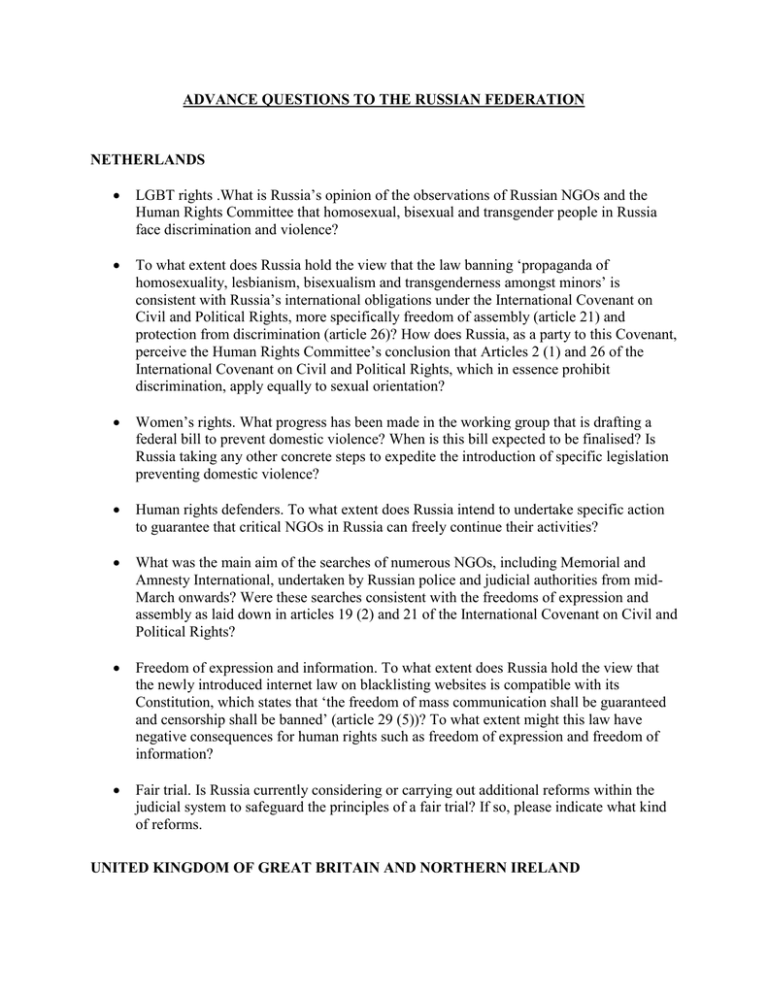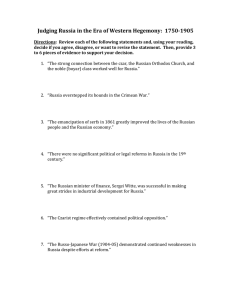ADVANCE QUESTIONS TO THE RUSSIAN FEDERATION NETHERLANDS
advertisement

ADVANCE QUESTIONS TO THE RUSSIAN FEDERATION NETHERLANDS LGBT rights .What is Russia’s opinion of the observations of Russian NGOs and the Human Rights Committee that homosexual, bisexual and transgender people in Russia face discrimination and violence? To what extent does Russia hold the view that the law banning ‘propaganda of homosexuality, lesbianism, bisexualism and transgenderness amongst minors’ is consistent with Russia’s international obligations under the International Covenant on Civil and Political Rights, more specifically freedom of assembly (article 21) and protection from discrimination (article 26)? How does Russia, as a party to this Covenant, perceive the Human Rights Committee’s conclusion that Articles 2 (1) and 26 of the International Covenant on Civil and Political Rights, which in essence prohibit discrimination, apply equally to sexual orientation? Women’s rights. What progress has been made in the working group that is drafting a federal bill to prevent domestic violence? When is this bill expected to be finalised? Is Russia taking any other concrete steps to expedite the introduction of specific legislation preventing domestic violence? Human rights defenders. To what extent does Russia intend to undertake specific action to guarantee that critical NGOs in Russia can freely continue their activities? What was the main aim of the searches of numerous NGOs, including Memorial and Amnesty International, undertaken by Russian police and judicial authorities from midMarch onwards? Were these searches consistent with the freedoms of expression and assembly as laid down in articles 19 (2) and 21 of the International Covenant on Civil and Political Rights? Freedom of expression and information. To what extent does Russia hold the view that the newly introduced internet law on blacklisting websites is compatible with its Constitution, which states that ‘the freedom of mass communication shall be guaranteed and censorship shall be banned’ (article 29 (5))? To what extent might this law have negative consequences for human rights such as freedom of expression and freedom of information? Fair trial. Is Russia currently considering or carrying out additional reforms within the judicial system to safeguard the principles of a fair trial? If so, please indicate what kind of reforms. UNITED KINGDOM OF GREAT BRITAIN AND NORTHERN IRELAND Can the Government of Russia update the Council on what steps are being taken to address socio-economic conditions in the North Caucasus as well as human rights violations including abductions, torture and extra-judicial killings? What work is being done to implement European Court of Human Rights’ judgements related to the region? What is the Government of Russia doing to ensure the protection of the rights of LGBT people, including through assessing the potential consequences of the proposed federal legislation outlawing “homosexual propaganda”? Following the closure of the investigation into Sergei Magnitsky’s death without any results – despite the Russian Presidential Committee on Human Rights conclusion in 2011 that his death was likely the result of being severely beaten and denied medical treatment - how does Russia intend to establish the full circumstances of his death and achieve justice for his family? Following widespread inspections of NGOs which work with international partners, what steps is Russia taking to ensure that NGOs in Russia are able to carry out their work to the benefit of civil society openly, transparently and without undue and unnecessary pressure? What concrete steps has the government of Russia taken to implement the recommendations of the UN Committee against Torture? MEXICO What steps are being taken by the Russian Government to guarantee an effective investigation of all torture allegations by the special department of the Investigation Committee of the Russian Federation created in 2012? Which obstacles has the Russian Government identified to ratify the ICCPR-OP 2? What are the main legal measures adopted by the Russian government aimed at protecting the working conditions of journalists and human rights defenders? How does the Russian government guarantee the effective investigation and prosecution of crimes and violations against human rights defenders and journalists?






